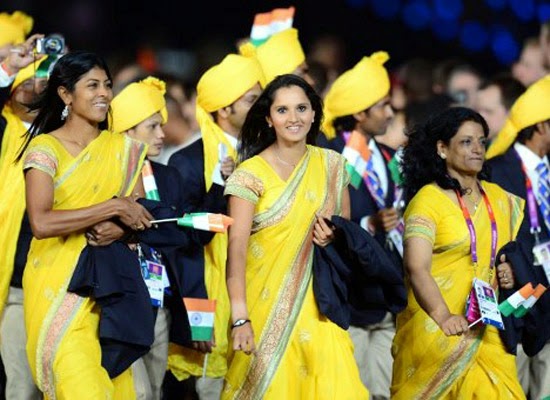Look at the photos below. What
do you observe?
The Indian contingent at the 2014
Asian Games opening ceremony. © AFP
Photo
retrieved from: http://sports.ndtv.com/asian-games-2014/news/230196-asian-games-2014-india-fined-for-last-minute-pullouts
The flag-bearer for India leads
the delegation during the opening ceremony of the 16th Asian Games in
Guangzhou, Guangdong province. (REUTERS)
Photo
retrieved from: http://www.emirates247.com/india-at-the-asian-games-1.318220
Members of India's delegation
parade in the opening ceremony of the London 2012 Olympic Games in the Olympic
Stadium in London on July 27, 2012.
Photo
retrieved from: http://www.sify.com/sports/Indian-contingent-greeted-with-huge-cheers-at-opening-ceremony-imagegallery-1-Olympics-mh2fE4cchbfsi.html
External Affairs Minister Sushma
Swaraj being received by Ambassador Asoke Mukerji (left), India's Permanent
Representative to the UN, after her arrival at JFK Airport in New York on
Wednesday, Sept 24, 2014. (Source: PTI photo)
Photo
retrieved from: http://indianexpress.com/article/india/politics/sushma-swaraj-begins-us-visit-scheduled-to-meet-100-ministers-from-seven-nations/
Recently, I began observing
photos on the internet a little more closely and began to find a pattern.
The more I looked, more the pattern seemed to establish itself. It seems that
we Indians, as a cultural and traditional unit, have shoved the entire
responsibility to uphold our culture and traditions on our women.
Across the spectrum, be it
sports, politics or administration, while attending ceremonies or in official
setup, I found that while men feel free to don any style of clothes they feel
like, the women always appear in traditional Indian attire. Is it a matter of
chance or is it by careful design that we have become so, as a society, as a
culture.
So, what’s my problem anyway?
Traditional Indian wear is elegant. Women look good in it, isn’t it? If only
the problem would have been that simple, limited to the clothes.
Let me clarify, I have no
problem with women wearing traditional attire. I have no problem with men
wearing western attire. My problem is with the mindset that lay beneath.
Furthermore, my problem is not limited to the way we expect the women to dress up;
it is just an extension of how we expect them to be in all other aspects of the
life as well. While the men have moved on to Jeans, Trousers, Suits, Tuxedos
etc. as daily or ceremonial wear, none of them Indian wear mind you, women have
been preserved in time. They are still expected to drape sarees or suits to fit
in with the traditional requirements.
Over the period of time, we
have put the onus on women to carry on the cultural and traditional values,
singlehandedly, be it inside the house or outside.
While we like to bask in the
glory of becoming a modern society, we have a rather complicated definition of
modern when it comes to the women of our society. If a guy wants to go out and
have a drink with his friends, it reflects the modern society that we live in.
However, when a woman of the same house wants to do the same, she is at loggerheads
with the culture and traditions. The fathers, brothers and husbands can have
female friends, of course, we live in modern times. But the mothers, sisters
and wives somehow can’t have equally close male friends, because they are trapped
in a different era it would appear.
Talking about traditions, here
is an example of an old tradition. Crossing the sea, known as
"Samudrolanghana" or "Sagarollanghana" states sea voyages
as the offences that cause the loss of varna or caste. Clearly, we have
moved ahead of such traditions. They were impractical and imposition restrictions.
However, no matter how educated, skilled or professionally successful a women
may be, her primary duties include cooking, cleaning and caring for the
household, the duties which she should carry out on her own with little to no
help from the men. Blame it on the tradition and go scot-free. This tradition hasn’t
become irrelevant or limiting, not to the men anyway.
We have come a long way from
the ancient Indian culture and traditions. This is a fact. We have, over time,
modified, discarded and added customs, practices and beliefs to the old culture
and traditions. This doesn't pose a threat to our heritage. This makes it alive,
strong and gives it longevity, for anything that is antiquated withers away. When
we have made accommodations in almost all aspects, why is there such resilience
when it comes to the women in our society? Why is it so that woman alone should
reflect our culture and traditions? Our vivid culture and meaningful traditions
are not merely limited to 3.5 meters of cloth.
But if that is how it is going
to be, then by all means we should rename Indian Culture and Traditions as Indian
‘Women’ Culture and Traditions.
Just for thought, look at the
Chinese contingent at the London Olympics, 2012. China too, is considered to be
a very traditional country. Just that they don’t express it exclusively in the
clothes their women wear.
Photo retrieved from: http://usa.chinadaily.com.cn/sports/2012-07/28/content_15625663.htm





Fabulous! Agree with many of the sentiments. But there's a deeper thing to observe here.. called "stereotyping". And it always surprises me to see how prevalent it is. Ever thought about how boys growing up are encouraged to be rough while girls are encouraged to stay soft? Bold and daring vs. reserved? Is it all that surprising that men are automatically assumed to be "head of family" (Most states)? I think that's the deeper line. How we question it and address it - is a matter to be pondered on.
ReplyDeleteConfers exactly with my views on this. You have put it brilliantly through the symbolism expressed by the attire! In numerous conversations, I found that many India men (not all!) are afraid to let their wives travel alone for excursion (even in "safe places" or countries). Agree, it is out of loving and protective nature. But a part of the answer also lies deep within our patriarchic society. In Europe, when you go out, you find many women travellers and many of them travelling all alone!
ReplyDelete